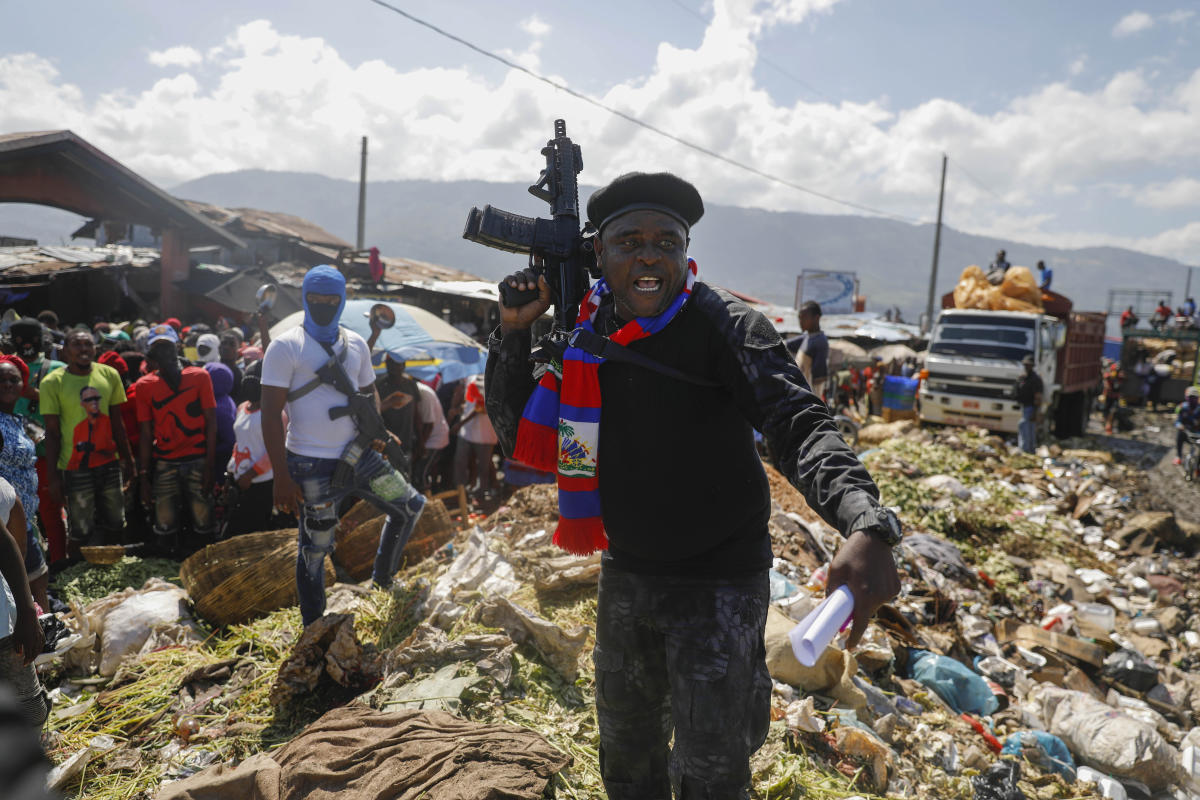SAN JUAN, Puerto Rico (AP) – A standoff between a powerful gang federation and the Haitian government is testing how much power both sides wield and threatening to further derail a paralyzed country where millions struggle to find fuel and water.
A former police officer who leads a gang alliance known as “G9 and Family” has proposed his own plan for Haiti’s future — even seeking cabinet seats — while demanding that Prime Minister Ariel Henry’s government grant an amnesty and arrest warrants against the group members, a demand that has so far gone unanswered.
In mid-September, the gang surrounded a major fuel terminal to demand Henry’s resignation and protest a spike in oil prices after the prime minister announced his government could no longer afford to subsidize fuel.
That action, coupled with thousands of protesters blocking streets in the capital, Port-au-Prince and other major cities, has led to widespread shortages, forcing hospitals to cut back on services, close gas stations and limit banks and supermarkets hours. .
In a recent video posted to Facebook, G9 and family leader Jimmy Cherizier, nicknamed “Barbecue,” read out a proposed plan to stabilize Haiti, including the creation of a “Council of Wise Men” with one representative from each of the the 10 departments.
The gang is also demanding positions in Henry’s cabinet, according to the director of Haiti’s National Commission for Disarmament, Decommissioning and Reintegration, speaking to radio station Magik 9 on Thursday.
“It’s a symptom of their power, but also a symptom of their fear of what’s to come,” Robert Fatton, a Haitian political expert at the University of Virginia, said of the gang’s demands.
Almost a week ago, Henry and 18 members of his cabinet called for the deployment of foreign troops to quell the violence and end the fuel blockade, a proposal that has yet to be formally discussed by the United Nations Security Council meeting Monday. .
The gang, which has taken over an understaffed and understaffed police station, is likely wary of the possible deployment of specialized armed forces, Fatton said.
“They’re trying to get the best deal they can while they have the upper hand to some extent,” he said.
Gang demands are nothing new in Haiti, and they have grown stronger since the assassination of President Jovenel Moïse in July 2021.
But such threats have been quickly suppressed in the past with the help of UN peacekeepers, Fatton said.
In the wake of an uprising that ousted former Haitian President Jean-Bertrand Aristide, then-President Réné Préval ordered gangs to lay down their arms. He did it peacefully at first, but when he got no results, he threatened them.
“They were told, ‘You disarm or you die,'” Fatton said. “Some gangs accepted the solution and others were destroyed.”
He said special forces used drones and invaded slums that gangs have long controlled.
But gangs have played an important political role before: the leader of a gang helped launch the rebellion that removed Aristide, who refused to resign before the end of his term in 2006. That leader, Butteur Metayer, was a supporter of Aristide, but turned on him after his brother, also a gang leader, was murdered in 2003.
Fatton said that while the demand to give Cherizier’s gang federation cabinet positions is “an outrageous proposition,” he added that an amnesty that involves giving up weapons could be a solution.
“The government saves face, the gangs say, ‘We got what we wanted,’ and there is a compromise,” he said.
But the demand to quash arrest warrants would likely be rejected by the government, which has long sought to arrest Cherizier on charges including orchestrating one of the country’s worst massacres, in which dozens of men, women and children were killed. .
Haitian officials have warned the international community that the situation is dire, noting that a recent cholera outbreak could also worsen due to limited availability of water and other basic services.
UNICEF warned on Friday that nearly 100,000 children under the age of 5 already suffer from severe acute malnutrition and are vulnerable to cholera: “The crisis in Haiti is increasingly a child crisis.”
It is also becoming a crisis for women. The United Nations Population Fund said on Friday that 30,000 pregnant women are at risk because about three-quarters of Haiti’s hospitals are unable to provide services due to lack of fuel.

